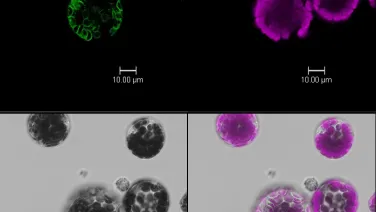PS Seminar Series - How will plants adapt to a high CO2 world?
In this talk I will discuss our progress in understanding the impact of eCO2 concentrations on a forest ecosystem using data from the Free-Air Carbon dioxide Enrichment (FACE) site at the Birmingham Institute for Forest Research (BIFoR), and show some recent data of the effects on the nutritional status of seed.
Speakers
Event series
Content navigation
Description
Abstract: Increasing atmospheric CO2 (eCO2) concentrations increase the productivity of C plants by enhancing the photosynthesis/photorespiration balance. In this talk I will discuss our progress in understanding the impact of eCO2 concentrations on a forest ecosystem using data from the Free-Air Carbon dioxide Enrichment (FACE) site at the Birmingham Institute for Forest Research (BIFoR), and show some recent data on the effects of eCO2 on the nutritional status of seeds. I will also present data from peas concerning eCO2 effects on phytohormones controlling plant growth and defence. Finally, I will consider the evidence that CO2 acts as a signal as well as a substrate. The classic concept of CO2 signalling in plants has thus focussed on a mode of action based on alterations in primary metabolism, particularly sugar availability and signalling. However, it has long been known that stomatal guard cells employ a pathway of sending CO2 concentrations that is independent of sugar signalling. The evidence that this and/or similar pathways exist in all cells will be discussed.
Biography: Christine Foyer is Professor of Plant Sciences at the University of Birmingham. She is a Member of the Environmental Sustainability Board of the FERRERO group and the Editor in Chief of Plant, Cell and Environment and Food and Energy Security. Christine has over 450 published papers and ranked as a Highly Cited Researcher™ list from Clarivate™. She is listed in the 2023 Edition of our Ranking of Top 1000 Female Scientists in the World. Ranked 15 in United Kingdom, and 192 in the world. She is ranked 7th in the list of the world's Best Scientists in Plant Sciences. (World's Best Plant Science and Agronomy Scientists: H-Index Plant Science and Agronomy Science Ranking 2024 | Research.com). Christine is an expert in plant metabolism and its regulation under optimal and stress conditions. Her lab focuses on the role of reduction/oxidation (redox) processes and signals regulate plant growth and stress tolerance, studying how primary processes (photosynthesis respiration) alter the redox status of cells and associated phytohormone signalling under optimal and stress conditions. Using model (Arabidopsis) as well as crop plants (wheat, barley, maize soybean and tomato) the lab investigates plant responses to abiotic (drought, heat, chilling, high light) and biotic (aphids) stresses.
Location
Please note: this seminar will be held in the Eucalyptus Seminar Room and via Zoom, details are included below.
Eucalyptus Seminar Room,
S205, Level 2,
RN Robertson Building (46)
Please click the link below to join the webinar:
https://anu.zoom.us/j/89612339145?pwd=ak1a51cWFcVmm6UFq-cECLT93h2MTg.JqlUFa8YkXwtWzmh
Passcode: 025442
Canberra time: please check your local time & date if you are watching from elsewhere.




